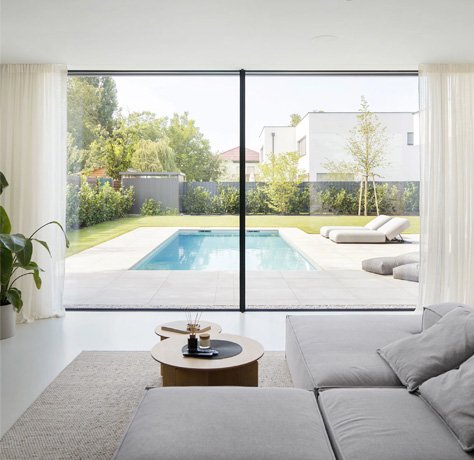When selecting windows for a home, energy efficiency is one of the top considerations. Well-insulated windows can lower utility bills, improve indoor comfort, and add long-term value to a property. Two popular choices are aluminum windows and vinyl (uPVC) windows. But which performs better when it comes to insulation and energy savings?
Energy Efficiency of Aluminum Windows
Aluminum is naturally a strong but conductive material, which means heat and cold can pass through it more easily than other frame types. This made early aluminum windows less energy-efficient.
However, modern aluminum windows have evolved with innovations such as:
- Thermal breaks — insulated barriers within the frame to reduce heat transfer
- Double or triple glazing — improved glass performance to enhance insulation
- Advanced coatings — to minimize energy loss and increase comfort
With these improvements, aluminum windows can now achieve excellent energy efficiency, often comparable to or better than vinyl in upgraded models. They are especially suitable for large glass panels and modern architectural designs where strength and slim profiles are needed.

Energy Efficiency of Vinyl (uPVC) Windows
Vinyl is a natural insulator, which means it doesn’t conduct heat or cold easily. Even without added enhancements, vinyl frames provide strong insulation performance.
This makes vinyl windows an attractive option for homeowners who want:
- Consistently high energy efficiency
- Reliable thermal performance across all climates
- Affordable pricing with low maintenance
However, vinyl is not as structurally strong as aluminum. For larger glass installations or contemporary designs, it may require bulkier frames, which can limit aesthetic flexibility.
Aluminum vs. Vinyl Windows: Energy Efficiency Comparison
| Feature | Aluminum Windows (with thermal break) | Vinyl (uPVC) Windows |
|---|---|---|
| Insulation Performance | Excellent (with thermal break + glazing) | High (natural insulation) |
| Frame Strength | Very Strong (ideal for large glass) | Moderate (best for smaller panels) |
| Design Flexibility | Slim, modern, customizable | Bulkier, limited colors |
| Lifespan | 30–40+ years | 20–25 years |
Final Verdict
- If energy efficiency alone is the deciding factor, vinyl windows perform strongly thanks to their natural insulation.
- If you want a balance of modern design, durability, and high energy efficiency, aluminum windows with thermal break technology are the superior choice.
Work with Delanshini Doors and Windows
At Delanshini Doors and Windows, we specialize in premium aluminum windows equipped with advanced thermal break systems and energy-efficient glazing. With over 20 years of experience, we provide:
- Custom service to match your project requirements
- Factory-direct pricing for maximum savings
- Global shipping for international clients
- Professional support from consultation to delivery
Get in touch today at wang@gddlsn.com to explore energy-efficient aluminum windows for your modern home.
Product Comparison & Buying Guides
Aluminum vs. Vinyl Windows: Which Offers Better Energy Efficiency?
Aluminum vs. Vinyl Windows: Which is Right for You?
Aluminum vs. Vinyl Sunrooms: Which One is Better?
Vinyl or Aluminum Sliding Doors – Which is Best?
Aluminum Casement Windows vs. Other Window Types: A Comparative Analysis
Comparison Guide: Casement Windows vs Double-Hung Windows
Bay vs. Bow Window: How Should I Choose?
